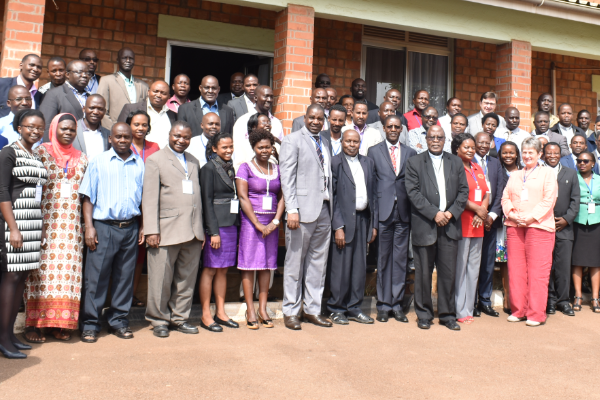Développement de la coopération régionale sud-sud pour transformer les conditions de travail en lien avec l’initiative de l’OIT L’avenir du Travail et les ODD (26-27 Avril 2017, Kampala)

Traduire:
An interreligious conference was held in Uganda from 26 to 27 April 2017 to deliberate on working conditions in relation to the ILO Future of Work initiative and the Sustainable Development Goals (SDGs). It was co-organized by the Justice and Peace Department of the Uganda Episcopal Conference, Kolping International, the German Commission for Justice and Peace and the International Labor Organization, with the participation of around 65 people from various countries of Africa such as Kenya, Tanzania, DRC, Ethiopia, Rwanda, South Sudan, Malawi and Zambia.
This initiative followed the engagement made through the Statement of Commitment and Action derived from the Global Seminar on “Sustainable Development and the Future of Work in the Context of the Jubilee of Mercy” held in Rome, between 2 and 5 of May 2016. Different organizations agreed to organize a series of regional consultations with the goal to continue the promotion of exchange and dialogue among themselves in the world of work. This was to be done in the context of the 50th Anniversary of the founding of the Pontifical Council for Justice and Peace, the ILO Future of Work Centenary initiative, and the annual International Labour Conferences (ILC), since dialogue and social justice are strong values held in common by both the Social Doctrine of the Church and the ILO.
JACODeWU (Joint Action Committee on Decent Work in Uganda) in partnership with the ILO and Catholic Inspired organizations that are working towards ensuring decent working conditions, organized this regional conference under the motto “Developing a South-South regional cooperation for joint efforts to transform working conditions in relation to the ILO Future of Work initiative and the SDGs” to call the attention of the critical issues in the world of work and how a regional cooperation can be built for more advocacy to a better world of work.
The objective of the conference was to bring together faith based organizations, civil society organizations, trade unions and employers’ associations and other key bodies from the region, mobilizing their efforts within a South-South and triangular cooperation framework with the view of contributing to the ILO Future of Work initiative, the achievement of the SDGs and the challenges related to the African continent.
The profound discussions and reflections, held during this interreligious conference have opened the path for further reflection, dialogue and cooperation between faiths based organizations and social organizations for the promotion of decent work for all especially at the regional level, within a South-South framework.
During the conference all the representatives of the organizations involved pronounced a Statement of commitment and action (see attached) in which they recognized the importance of numerous challenges such as:
- In the East African context, a large share of the working poor are engaged in agriculture related activities, and endure the adverse effects of climate change. In this situation, they should be supported by governments, at national and local levels, together with civil society organizations by devising and implementing policies that are geared at improving food security and promotion of sustainable tourism that creates jobs and promotes local culture and products.
- Youth, including young women, is in Africa the largest segment of the population and also one of the group suffering most from unemployment. Adequate education, vocational training and capacities need to be provided to empower young people and create an enabling local business environment. The organizations involved have a specific role to play in partnership with all relevant public and private actors who could also contribute to employment, job creation and entrepreneurship.
- In this region, people are increasingly looking for employment opportunities beyond their home country for a decent pay and survival. For sending countries, it is a consequence of imbalances in the labour market resulting from high rates of unemployment, underemployment among low-skilled workers, low wages for skilled workers and unmet demand for education. Cases of migrant workers abuses are on the rise. The organizations call upon their governments and all relevant partners to ensure that migrant workers benefit from the same rights and protections as all workers.
- It is a common and central tenet of many faiths and denomination to acknowledge and promote the dignity of work and the rights of workers. As stated in the ILO Philadelphia Declaration in 1944: Labour is not a commodity. The organizations committed themselves to engage in the promotion of the dignity of work, as a care for creation and humankind.
In conclusion, the conference provided an opportunity for analyzing critical issues in the world of work and information sharing among people from different walks of life. The dialogue has extended a clear invitation to faith based organizations, trade unionists, employers and academia not only to become involved but to actively participate in working towards transforming working conditions. The participants hope that this event will help to build a strong working relationship and a more productive link across the region for sustainable development.

